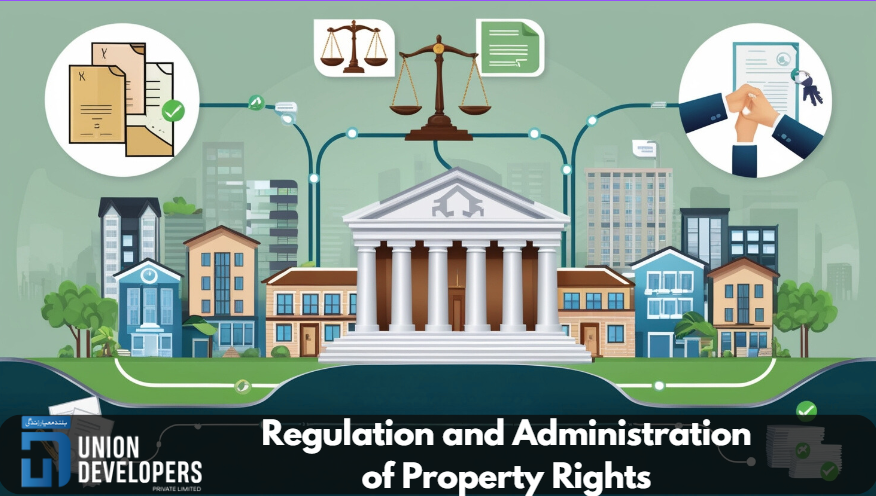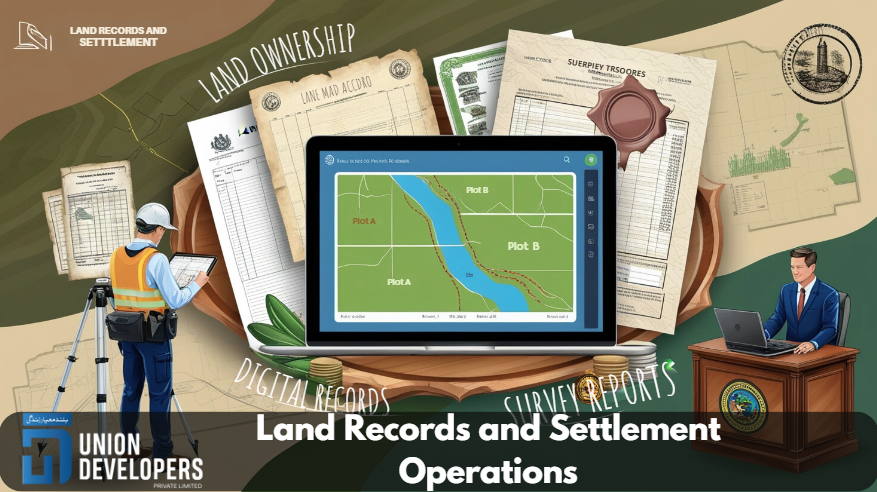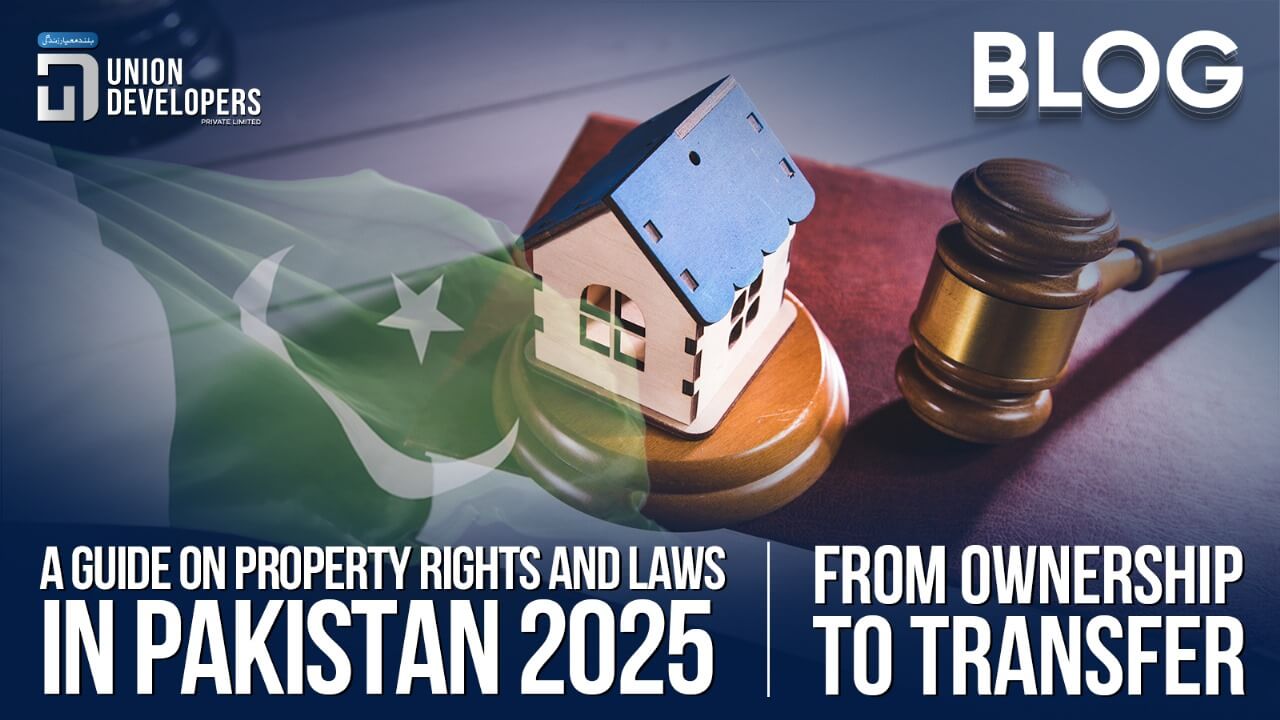Complex real estate laws monitor property and real estate rights. They regulate, define, and protect ownership and the transfer of property and land. The major role of these rules and regulations is to bring transparency to the real estate market and avoid fraud. Pakistani citizens are required to follow the enforced real estate laws, which ensure the legal proceedings of property rights in Pakistan. This guide will walk through the property laws in Pakistan. Its major focus is on the types of ownership, property, transfer processes, land records, and rules that are in regulation.
What Are The Property Rights In Pakistan?

Property rights are known as the legal rights to possess, dispose of, and use property or assets, whether they are tangible or intangible. The term ‘property’ in Pakistan refers to movable and immovable assets, items, or properties.
Tangible property is a physical asset like machinery, land, or buildings. On the other hand, intangible properties refer to things like patents or intellectual property.
Moreover, the specific term ‘land’ is known as immovable property, forming a part of the property category in the legal world. The Pakistan legal structure explains the distinction between property and land. The ‘land’ is always a form or type of property; other forms, like intellectual assets, are classified differently. This classification affects how property is transferred, managed, and recorded under the law of Pakistan.
Property Ownership And Constitutional Provisions In Pakistan
The Constitution of Pakistan protects property rights under different articles. Here are the main articles that are relevant to property ownership and also the protection of property.
| Article 23 ensures every Pakistani has the right to acquire, dispose of, and hold property. The property that can be subjected to any restrictions imposed by the Pakistani law. Article 24 guarantees that no property shall be taken without lawful authority, with compensation, except for a public purpose. Article 173 grants the right to acquire property in the public interest to both provincial and federal governments. Article 172 handles unclaimed property and states that property without any rightful owners shall vest with the federal or provincial government. |
These articles ensure that individual rights are protected in Pakistan. This way no unauthorised party can possess any property without proper legal ownership.
Regulation and Administration of Property Rights

The land administration and property rights enforcement are linked to the Revenue Collection System in Pakistan. The revenue department is responsible for managing property rights enforcement and land records. The sub-district offices in Pakistan, like village offices and Tehsils, manage local administration.
Important: The land record system is critical to ensure that property rights are legally enforced and recognised in Pakistan. Otherwise, the chances of possessing others’ land are high without any legal rights.
The land record system helps validate the claims, trace the ownership of land, and facilitate smooth property transactions. The Revenue Collection System supports the documentation of the properties and updates the property transactions at the Tehsil and village levels.
The land record system is critical for ensuring that property rights are legally recognised and enforced. It helps trace ownership, validate claims, and facilitate smooth property transactions. At the core of this system is the Revenue Collection system, which supports the documentation and updating of property transactions at the village and Tehsil levels.
Land Records and Settlement Operations

When we talk about the property rights enforcements in Pakistan, the land records are the backbone. The settlement operations started in the mid-18th century. This is conducted to map and measure the land for record-keeping purposes.
The regulatory authorities use these operations to establish the boundaries, ownership, and use of land. This is typically carried out every 25 years, with Jamabandi (updated records) every four years.
These records help the legal authorities to track the rights, ownership, and land revenue. This record is crucial for the property tax collection for the government of Pakistan.
A good land record system helps to maintain transparency, reduce any land disputes, and ensure proper revenue collection.
The land record officer and revenue officer play vital roles in the maintenance of the records and also look after the mutation and verification of the records. The changes in the ownership are done accurately and rightfully.
Laws and regulations of property rights in Pakistan

Several laws govern property rights in Pakistan. Each law handles different aspects of land transfer, ownership, and dispute resolution.
Land Revenue Act, 1967
This act deals with the foundation of transfer processes and property record maintenance in rural areas.
Transfer of Property Act, 1882
This act governs the transfer of property rights, including the lease, sale, and mortgage of properties.
Registration Act, 1908
It ensures that property transactions are officially recorded and registered with the relevant regulatory authorities to make them legally binding.
Local and special laws
These laws are related to cooperative societies, housing societies, and cantonment boards essential for urban properties.
The Land Revenue Act regulates land transactions in rural properties. The Registration Act and Transfer of Property Act monitor the property transactions in the urban areas. These real estate laws have provisions as well regarding the obligations and rights of property owners and the property transfer formalities.
Ease Of Property Transactions For Overseas Pakistanis

Recently, the Punjab Government was considering an amendment to the one hundred sixteen-year-old Registration Act of 1908 to simplify property transactions for overseas Pakistanis.
This initiative came after observing the complexity of property dealings of Pakistanis living abroad. Many people were facing a lot of fraudulent activities and hurdles when trying to buy and sell property in Pakistan.
Section 31 of the Registration Act 1908 required overseas Pakistanis to send their power of attorney to a representative in Pakistan, who would be the authorised person as well on their behalf. This requirement caused delays but also carried the risk of fraud.
The Punjab government came in collaboration with the Ministry of Foreign Affairs (MOFA) and started working on a system that could allow overseas Pakistanis to complete property transactions without having to come back to Pakistan.
Once this amendment to Section 31(1) of the Registration Act gets passed, expats will be able to submit the sale deed statement directly to the Embassy of Pakistan in their residing country.
The MOFA officers at the embassy will verify and process the transaction of the property. The seller or buyer in Pakistan will complete the process at the sub registrar’s office, and the verification will be done via the NADRA system.
Also, have a look at the major points on the new duty rates on property transactions in Pakistan.
Reforms to the Land Records System
There has been a knack for digitising land records across Pakistan. The Punjab Land Record Authority Act, 2017 has been the key indicator that introduced the Arazi Record Centre that digitised the land records. These online property registration record systems promise transparency; the traditional system also operates in parallel in any discrepancy cases.
Wrap-Up
Real estate agents are obliged to comply with local property laws to reduce the chances of fraud and legal disputes. The legal framework ensures the monitoring of property ownership, transfer, and disputes by various real estate laws. The real estate laws include the Transfer of Property Act, Land Revenue Act, and Registration Act. Without following these laws, no one can own, transfer, or sell any property in Pakistan. Everyone, especially real estate developers, must have in-depth knowledge of these laws. Moreover, everyone must stay updated with these laws and any new updates to avoid penalties.




